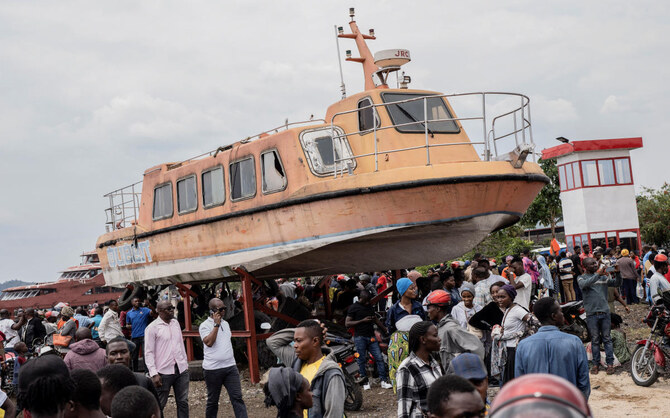GOMA, Congo: At least 78 people died when an overcrowded boat with 278 passengers capsized on Lake Kivu in eastern Congo on Thursday, a local governor said.
According to Jean-Jacques Purusi, governor of the South Kivu province, the death toll was provisional and the number of fatalities could rise. He spoke to The Associated Press over the phone hours after the tragedy.
The boat, overloaded with passengers, sank while trying to dock just meters (yards) away from the port of Kituku, according to witnesses. It was going from Minova in South Kivu province to Goma, in North Kivu province.
Earlier in the day, witnesses said they saw rescue services recover at least 50 bodies from the water. The boat, overloaded with passengers, sank while trying to dock just meters (yards) away from the port of Kituku, they added. It was going from Minova in South Kivu province to Goma, in North Kivu province.
The witnesses said 10 people survived and were taken to the local hospital. Local officials later reported that as many as 50 were rescued. The search and rescue efforts were continuing.
It was the latest deadly boat accident in the central African country, where overcrowding on vessels is often to blame. Maritime regulations also are often not followed.
Congolese officials have often warned against overloading and vowed to punish those violating safety measures for water transportation. But in remote areas where most passengers come from, many are unable to afford public transport for the few available roads.
In June, an overloaded boat sank near the capital of Kinshasa and 80 passengers lost their lives. In January, 22 people died on Lake Maî-Ndombe and in April 2023, six were killed and 64 went missing on Lake Kivu.
Witnesses of the Thursday tragedy said the boat was visibly overcrowded.
“I was at the port of Kituku when I saw the boat arriving from Minova, full of passengers,” Francine Munyi told the AP. “It started to lose its balance and sank into the lake. Some people threw themselves into the water.”
“Many died, and few were saved,” she added. “I couldn’t help them because I don’t know how to swim.”
The victims’ families and Goma residents gathered at the port of Kituku, accusing authorities of negligence in the face of growing insecurity in the region.
Since the fighting between the armed forces and the M23 rebels made the road between the cities of Goma and Minova impassable, forcing the closure of the passage to trucks transporting food, many traders have resorted to maritime transport on Lake Kivu. It’s an alternative considered safer than road traffic, which is threatened by insecurity.
But according to Elia Asumani, a shipping agent who works on this line, the situation has become dangerous:
“We are afraid,” he told the AP. “This shipwreck was predictable.”
Bienfait Sematumba, 27, said he lost four family members.
“They are all dead. I am alone now,” he said, sobbing. “If the authorities had ended the war, this shipwreck would never have happened.”
The survivors, about 10 of them, were taken to Kyeshero hospital for treatment. One of them, Neema Chimanga, said she was still in shock.
“We saw the boat start to fill with water halfway,” she recounted to the AP. “The door of the boat opened, and we tried to close it. But the water was already coming in, and the boat tilted.”
“I threw myself into the water and started swimming,” she said. “I don’t know how I got out of the water.”


























